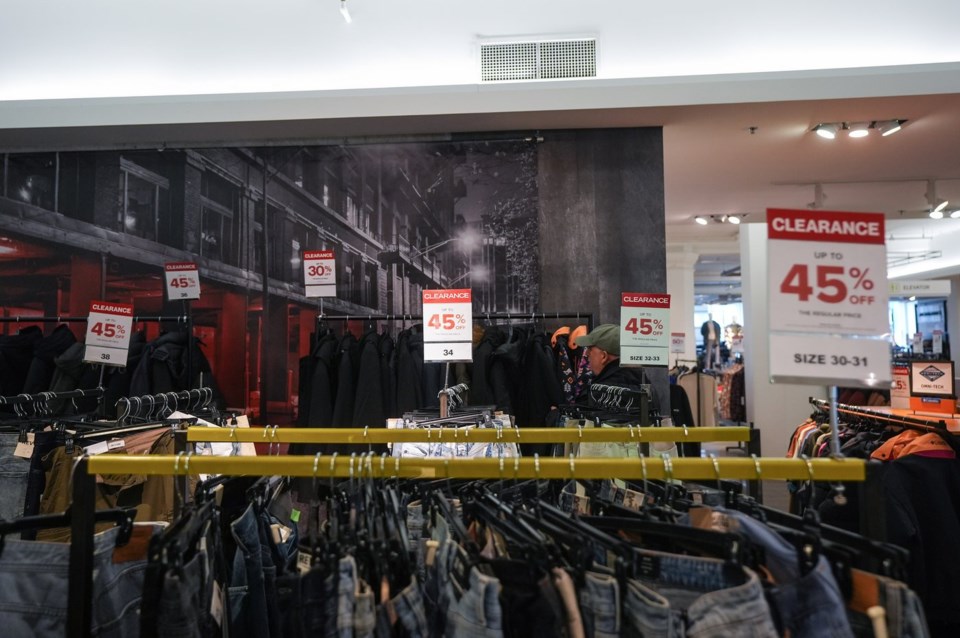Yair Altman is about to have a lot of extra pillows on hand.
His Montreal-based company SmartSilk has been selling bedding to Hudson’s Bay since about 2010, but with the department store closing all but six of its stores by mid-June, Altman has to find a solution for his Bay-bound merchandise.
“It creates a bit of an inventory situation,” he explained.
“We have more inventory and the inventory sits in the warehouse, which is space and rent, and now we have to find another home for that inventory because we have more coming in.”
Altman says the situation unfolding at his company is likely also taking shape across the hundreds, if not thousands, of businesses whose wares have been sold at the Bay and its sister Saks retailers.
Since their parent company filed for creditor protection last month, many merchants are scrambling for a new sales point for goods once destined for Bay and Saks shelves.
Finding a new home for merchandise that would have been sold at the Bay and Saks won’t be easy for several reasons.
Many department stores faltered long before the Bay and those remaining won’t have room to take on every brand its competitor stocked. La Maison Simons, for example, is dominated by private labels and Holt Renfrew has too ritzy a standard for several Bay brands.
“The only ones that are really left are the Walmarts of this world, and the TJ Maxxes,” said Altman. “They're the ones who do the most volume but they’re price shoppers.”
He said that means if you sell a product for $10, these companies will often only pay you $5 or $6 and most businesses “can’t survive that way.”
Altman will move excess merchandise through other retailers that already sell SmartSilk, like Costco, making the situation “not something horribly terrible."
But some may have no other choice than to go with a retailer demanding deep discounts because time won't be on their side.
Because many have to manufacture in advance to meet demand, they’ve long since placed orders for the summer and are already focused on fall and winter.
Any delay selling merchandise puts their entire season, supply chain and profit at risk.
"Every day that a product is in a warehouse or available, it's diminishing in value," said Michelle Watson, whose apparel brand Michi has previously had to pivot when other retailers have closed. "We want to be selling it as quickly as possible and then not having it reach markdown status."
At SmartSilk, production can take between 45 and 60 days and shipping merchandise from Asia to Canada takes another 30, so Altman has to plan four months in advance.
“What we’ve bought to come in for April, May and June, we can't change,” he said.
“We may be able to ask the factory to delay a shipment by two to three weeks, but we can't do much more than that because that puts a tremendous strain on their cash flow. We’re all intertwined.”
A business can ask ports to hold their containers, but SmartSilk said storage can cost $300 a day.
"It becomes unmanageable," Altman said.
To avoid that situation, Mike Purkis, president of Joe Boxer-maker Caulfeild Apparel Group Ltd., said some companies are pushing to keep their products at sea, buying them more time.
"I was reached out to through an agency saying, 'Hey, can you help my partner? They have nine containers on the water of product,'" he said.
He didn't name the company who sought his help but suspects many Bay merchants are facing similar struggles and may never find a lifeline.
"I don't know how certain people handle that big of a hit," Purkis said. "For the companies that aren't diverse (in sales channels), that's going to be a problem."
Canadian Down and Feather, a Toronto-based pillow maker, doesn't anticipate much of a hit from the Bay but will look for new sales avenues anyway.
"Whether it's Sleep Country or Simons or Linen Chest or others that we may not deal with today," CEO Ashwin Aggarwal said. "We deal with a significant number of the Canadian retailers already, but we're hoping to continue to find new retail partners and continue to diversify."
He and Altman considered themselves lucky to not be owed more money and to have twigged to Hudson's Bay's financial troubles long ago because of late payments, so they were able to prepare for the demise of that sales channel.
Other businesses didn't have that forethought and relied solely on Hudson's Bay. Some of them have told Altman they want to sell excess inventory in the U.S., where the population is higher but tariffs also loom large.
But establishing those relationships takes time and connections many Bay merchants don't have, said Mike Croza, founder of the Supply Chain Alliance.
"I feel bad for the Canadian businesses, who are smaller and they just don't have the resources to anticipate all of these changes and the internal capabilities to deal with this in a very effective way," he said.
"I would think the owners of those businesses are definitely having sleepless nights trying to figure it out."
This report by The Canadian Press was first published April 22, 2025.
Tara Deschamps, The Canadian Press




